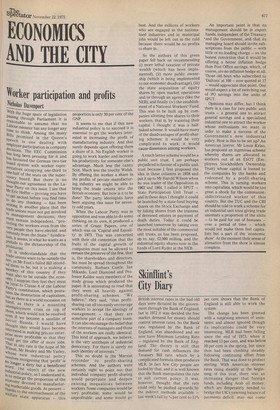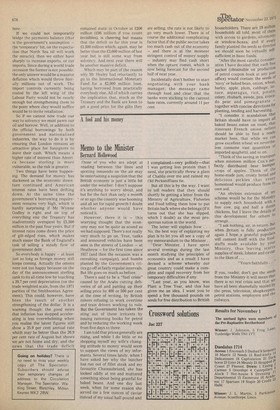Skinflint's City Diary
British interest rates in the bad old days were dictated by the government through the Bank of England, but in 1972 it was decided the free market demand for money should control interest rates. So the Bank rate, regulated by the Bank of England, was abandoned and we now have Minimum Lending Rate — regulated by the Bank of England. The theory is still that demand for cash influences the Treasury Bill rate, which by a complicated formula then produces MLR. In fact few City people are fooled by that, and it is well known that the Bank manipulates the rate to suit current policy. It was, however, thought that the rate could only be pushed upwards by the indirect methods available — last week's fall by ¼ per cent to 1134
per cent shows that the Bank of England is still able to work the system.
The change has been greeted with a surprising amount of uninterest and almost ignored though its implications could be very interesting. MLR had been falling since the end of 1973, when it reached 13 per cent, and was below 10 per cent in the spring, but since then had been climbing steadily following continuing effort from the Bank. That was done to protect sterling. With American interest rates rising steadily at the beginning of this year. there was an increasing danger that foreign funds, including Arab oil money. which are desperately needed to bridge the UK's yawning balance of payments deficit. may not come If we could not temporarily bridge the payments balance (that is the government's assumption the 'temporary' bit, on the expectation that North Sea oil will work the miracle), then we either have sharply to increase exports, or cut imports. Since during a world trade recession the former is not possible, the only answer would be a massive deflation which would throw literally millions out of work. The import ' controls currently being touted by the left wing of the Labour Party would not be nearly enough but strengthening them to the point where Lhey would suffice would be to invite retaliation.
So if we cannot now trade our way to solvency we must pawn our oil and borrow. Well, in addition to the official borrowings by both government and nationalised industries, the way to do it is by ensuring that London remains -an attractive place for foreigners to leave their cash. Which means a higher rate of interest than America because sterling is more vulnerable, so the risk is greater.
Two things have been happening. The demand for money has slackened as the economic downturn continued and American interest rates have been drifting down. At the same time the government's borrowing requirement remains very high, which is hardly surprising if Mr Wynne Godley is right and on top of everything else the Treasury has inadvertently overspent by £5,500 million in the past four years. But if interest rates come down the price of gilt-edged rises, which makes much easier the Bank of England's task of selling a steady flow of government debt.
So everybody is happy at least just so long as foreign money still keeps coming. Actually the omens were not too happy because on the day of the announcement sterling sank to its all-time low by tooching a 29.7 per cent depreciation (on the trade weighted scale, from the 1971 parities of the Smithsonian Agreement). This could, however, have been the result of another strengthening of the dollar. It is a warning though: the good news that inflation has stopped accelerating is less overwhelming when you realise the latest figures still show a 25.9 per cent annual rate which may be better than the 26.9 per cent rate of August but shows we are not home and dry; and the news that the trade deficit remained static in October at £206 million (£96 million if you count invisibles), is cheering but means that the deficit so far this year is £1,500 million which, again, may be better than the £3,660 million of last year but is still some way from solvency. And next year there will be another massive deficit.
Which may be part of the reason why Mr Healey had reluctantly to go to the International Monetary Fund for a $2,000 million loan, having borrowed from practically everybody else. All of which carries the implication that, much as the Treasury and the Bank are keen to get a good price for the gilts they
are selling, the rate is not likely to go very much lower. There is of course the additional complicating factor that if the public sector takes too much cash out of the economy
and there is at the moment stringent control of money supply industry may find cash short when the upturn comes, which is now being forecast for the second half of next year.
Incidentally don't bother to start negotiating with your bank manager; the message came through loud and clear that the banks were sticking to the current base rates, currently around 11 per cent.

































 Previous page
Previous page